Khaled al-Jeratli | Jana al-Issa | Ali Darwish | Hassan Ibrahim
The Assad regime has fallen, but the accountability processes that Syrians have awaited for years have not extended to its known figures who committed violations and crimes against Syrians, as documented by international and local organizations.
Officers and military personnel from civilian backgrounds formed the backbone of the military apparatus of the ousted regime, and they were its fist in attempts to quell the Syrian movement over the past 14 years. Some of them remain at large either in Syria or in neighboring countries to which they fled alongside Bashar al-Assad to Moscow.
The Syrian president in the transitional phase, Ahmed al-Sharaa, stated on various occasions that he is determined to launch a pathway for transitional justice aimed at holding accountable the major perpetrators of war crimes in Syria, but the features of this pathway have not yet become clear.
While the actions of the interim government in Damascus remain timid in this regard, the demand for accountability for the perpetrators of crimes from the ousted Assad regime continues to escalate, sometimes going so far as to call for the accountability of war correspondents, university professors, and influential individuals in the ousted regime.
Government promises and calls for de-escalation
The charges and demands for the accountability of perpetrators of crimes surged due to several recent events, the first being the appearance of several former regime figures in video recordings threatening to carry out targeted operations against the security and military leadership, which was translated on the ground by the killing of several members of the General Security Service and Military Operations Administration through ambushes carried out by remnants of the former regime.
Among the prominent figures who stirred public demand for accountability and issued threats to Syrians is former Republican Guard member Miqdad Fatiha, who announced on February 6 that he founded the Coastal Shield Brigade in the mountains of Latakia, threatening to launch military operations against the Military Operations Administration and General Security Service.
The second significant event was the appearance of leaders from the former regime in places where they committed massacres against civilians. On February 7, demonstrations took place in the al-Tadamon neighborhood south of Damascus following the visit of Fadi Ahmad, known as “Fadi Saqr,” to the neighborhood, who is one of those responsible for the Tadamon Massacre.
What further inflamed the residents was news that Fadi Saqr had made a “settlement” with the new authorities and that he was one of the members of the civil peace committee. However, Enab Baladi could not verify the accuracy of this news.
Demonstrators demanded the security and military leadership of the interim Damascus government arrest Fadi Saqr and hold him accountable for the crimes he committed over the years.
Saqr had been the commander of the National Defense Forces in al-Tadamon and then in Damascus, and he was one of those responsible for the reconciliation file during the previous regime. This file includes several figures negotiating with opposition fighters in areas besieged by the army and affiliated militias, ending in the displacement of fighters along with families from these areas.
The third event was that officials from the Assad regime who participated in violations against Syrians and journalists who accompanied the Assad forces and affiliated militias in their military operations, were increasingly appearing in media interviews.
Some of these interviews revolved around justifying the former officials’ pro-regime stance or denying their involvement in violations or knowledge of what was happening in terms of torture and killing of civilians in prisons.
The ousted Assad regime’s Minister of Interior, Mohammad al-Shaar, surrendered himself voluntarily to security forces and appeared in an interview with Al-Arabiya channel, where he denied committing any actions punishable by law, despite having participated in committing crimes in Syria and Lebanon, as documented by rights centers.
Additionally, elements and leaders from remnants of the former regime have been conducting campaigns on social media based on sectarian and ethnic incitement.
This situation has created a charged environment and provocation among the Syrian street, which refuses to see its torturers walking through its neighborhoods and among its children.
Meanwhile, the Syrian Minister of Defense, Murhaf Abu Qasra, downplayed the danger of the areas where remnants of the former regime are spreading, stating that they are being dealt with and their threat is diminishing.
The government: Campaigns and promises
In his speech to the Syrian people following his appointment as the transitional president, Ahmed al-Sharaa focused on ensuring civil peace, transitional justice, and building state institutions, participating in the transitional phase by forming an inclusive government and a mini legislative council, and launching a national dialogue conference.
He stated that he focuses in the upcoming period on setting priorities, among which is achieving civil peace, and pursuing the criminals who have soaked their hands in Syrian blood, committing massacres and crimes against the people, whether they have hidden inside the country or fled abroad via “genuine transitional justice.”
Regarding the form of transitional justice in Syria, al-Sharaa said in a later interview that there is a very important fine line between transitional justice and civil peace. He stated, “If we neglect people’s rights, this will affect civil peace, and if we are too strict in demanding people’s rights, this will also affect civil peace, leading to a state of terror.”
Al-Sharaa added that since the launch of military operations, no amnesty has been issued for those who committed organized crimes, amid ongoing pursuit of “big criminal heads,” deeming it difficult to address every detail that occurred over the past 60 years. He considered that people should rise above certain rights while focusing on rights related to organized crimes, and that “this is the thread that preserves transitional justice and civil peace.”
He also linked the improvement of the economic situation and the activity of any economic investment in Syria to the existence of a just judiciary and the availability of a secure stability environment, asserting that a successful economy requires many institutional reforms.
Al-Sharaa, two days after the regime’s fall and in light of criticism regarding the forgiveness of former regime elements, especially those who committed crimes, promised to announce “List No. 1” that includes the names of the major perpetrators of torture against the Syrian people.
He stated, “We will not hesitate to hold accountable the criminals, murderers, and security and army officers involved in torturing the Syrian people. We will pursue the war criminals and demand them from the countries they fled to so that they receive their just punishment.”
Al-Sharaa discussed the new administration’s intention to offer rewards for information about senior army and security officers involved in war crimes, adding, “We have confirmed our commitment to forgiveness for those whose hands are not stained with Syrian blood, and we granted amnesty to those who were only conscripts. The blood of innocent martyrs and the rights of detainees are a trust that we will not allow to be squandered or forgotten.”
According to what the Minister of Defense, Murhaf Abu Qasra, mentioned in an interview with Al-Araby Television, settlements do not negate subsequent legal accountability, and they are necessary to control the situation and prevent chaos, stabilizing the current situation until these individuals can be dealt with through the relevant authorities. Anyone with criminal charges or involved in torture should be held accountable through judicial institutions.
However, thus far, no judicial rulings have been issued regarding the accountability of former regime leaders who have been arrested or made settlements. One of the most prominent figures who made a settlement is the former commander of the Republican Guard Talal Makhlouf.
At the beginning of the Syrian revolution, Makhlouf was the commander of the 105th Brigade. In 2016, he was appointed commander of the Republican Guard, and during these years, the Republican Guard participated in suppressing peaceful demonstrations and bombarding and storming cities, especially in Eastern Ghouta and the neighborhoods of eastern Aleppo.
Enab Baladi posed a series of questions to the Ministry of Justice in the interim Damascus government, inquiring about “List No. 1” and when it would be issued, whether there is cooperation or coordination with other countries for the extradition of wanted individuals, and what steps the Ministry of Justice is taking in the transitional justice process and what its nature is.
The ministry, for its part, refused to respond to all these questions.
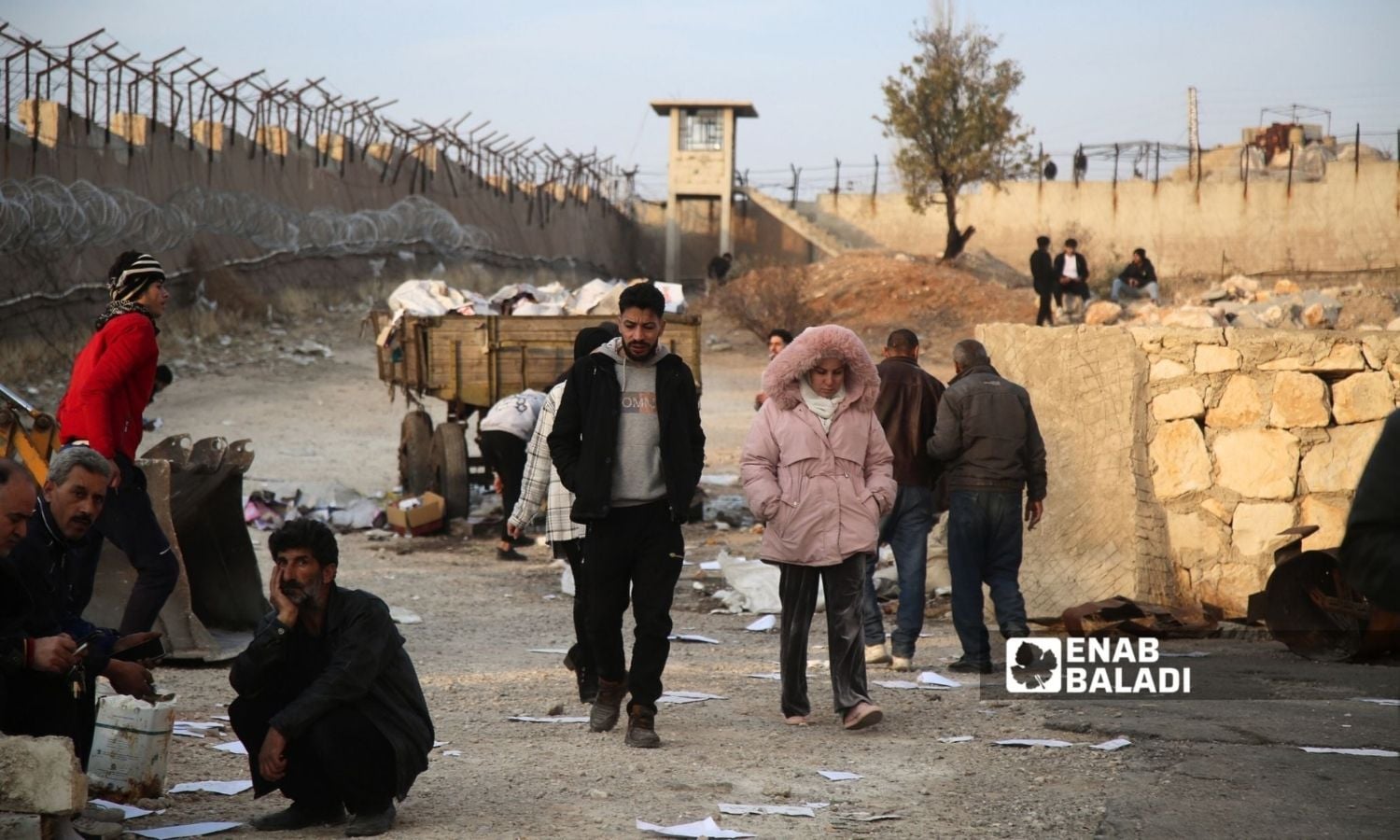
Civilians searching for their detained relatives in Sednaya prison – December 10, 2024 (Enab Baladi)
What justice does Syria need?
The importance of applying transitional justice in Syria comes from being a balanced alternative to two “dangerous” operations: completely burying the past and ignoring the legacy of violations. The first is practically impossible because the effects of these violations are ongoing and present. The second approach is to seek individual or collective vengeance, which may lead to the collapse of the state concept and plunge the country into a vortex of chaos and violence, according to rights activist and researcher at the Syrian Dialogue Center, Nawras al-Abdullah.
In an interview with Enab Baladi, the researcher stated that the system of transitional justice, through a practical approach, allows for a balance between addressing the consequences of the past appropriately and interacting with present requirements while laying the foundations for the future.
The importance of implementing transitional justice in Syria lies in being a balanced alternative to two highly dangerous processes: completely burying the past and ignoring the legacy of violations, which is practically impossible, as the effects of these violations are ongoing and present. The second approach is the tendency toward individual or collective revenge, which means dismantling the state concept and sinking into a vortex of chaos and violence.
Nawras al-Abdullah, Researcher at the Syrian Dialogue Center
On another note, al-Abdullah believes that implementing transitional justice, in principle and regardless of the numerous details, allows for the building of a new state that ensures that what happened previously does not recur and facilitates the creation of “a true Syrian national identity.”
The path toward justice in Syria, or as it has recently been termed “the transitional justice phase,” begins with a transitional justice body formed through community consultations and discussions that lead to consensus on individuals who join this body. This is seen by the director of the Syrian Network for Human Rights (SNHR), Fadel Abdul Ghani, provided that the members of this body are experts in transitional justice issues and international law, as well as in documenting violations, in addition to human rights civil society organizations and victim associations, in partnership and coordination with the government.
Abdul Ghani added during his interview with Enab Baladi that the body should not be formed by the government, and it is a mistake to believe that the “Transitional Justice Body” is an entity aligned with the government. Rather, it should be formed through a societal-driven process that the government sponsors.
This body oversees the coordination process that leads the state to the path of justice, and through the state institutions themselves, but with complete independence from the state, as its work is linked to accountability, which is a judicial process carried out through the courts.
The Transitional Justice Body holds the responsibility within the accountability framework to transfer individuals to trials in preparation for their accountability, and in this phase, the body plays a role similar to that of the public prosecution, according to Abdul Ghani, which makes it essential to establish the independence of its operational path from the state.
The director of the Syrian Network for Human Rights added during his discussion with Enab Baladi that the concept of transitional justice fundamentally aims to “apply justice in a transitional phase,” especially since in this phase, the conflict itself may be reflected, particularly in the Syrian case where two parties exist. The first is the perpetrator of the violations, who has transitioned to the transitional phase, while the second party is the victim of the violation, demanding progress from the first party, while the second party demands accountability, creating a state of conflict between the parties during this phase.
The philosophy of transitional justice aims to avoid falling between these parties during the period the country is transitioning, with these same parties present, according to Abdul Ghani.
Three major challenges
The phase faces numerous obstacles that are similar within contexts, according to researcher Nawras al-Abdullah, who identified three major challenges facing the phase from his perspective.
The researcher stated to Enab Baladi that the first challenge is building “major national compromises” around the philosophy of transitional justice and how focused it is on judicial and non-judicial mechanisms. Despite the exceptional preparations in the Syrian context regarding awareness, studies, discussions, and various procedures for implementing transitional justice, there are dozens of propositions, each correct in part, which in itself is a challenge for the phase.
He added that balancing stability and services during the current phase with launching a comprehensive path for transitional justice is another challenge, as the number of perpetrators of violations in Syria, the spread of weapons, and the weakness of institutions that should play major roles in justice and law enforcement agencies pose additional challenges.
The researcher and rights activist considered that economic factors and regional and international political circumstances constitute obstacles to a smooth transitional justice phase, as these aspects impose their conditions on the logic of transitional justice in Syria, often acting as negative rather than positive factors.
Regarding the timeline for beginning the practical path of transitional justice, al-Abdullah stated that the path has indeed commenced with the dissolution of security institutions and the arrest of certain involved individuals, the dissolution of the National Progressive Front parties, and other steps. Although these measures are considered preliminary and more related to organizing the current scene than responding to the logic of justice application, he views this as “natural,” as practical paths of transitional justice are not a cohesive block implemented as a project with a specific beginning and end, and cannot be viewed this way.
The researcher emphasized the importance of being cautious about proceeding with individual and partial measures by the transitional authority without gathering as much consensus as possible regarding the necessary determinants and mechanisms of transitional justice, and governing this through text and formal structures, such as establishing a ministry or body for transitional justice to ensure effective participation from all forces supporting transitional justice.
Al-Abdullah considered that, in theory, transitional justice should encompass all parties, but this approach is “purely theoretical.” Practical experiences in various countries reveal the real impact of the transformation method on the logic of transitional justice, so it is worth considering the notion of “repairing all victims’ damages” after defining who qualifies as a victim. It is unwise to cling to the theoretical idea of complete accountability because it leads to a rupture in reality, which itself is one of the contentious issues, according to the researcher.
He pointed out the need to understand and absorb the lessons learned from different experiences in producing a Syrian approach to transitional justice, which will not be a matter of consensus in any case and the debate around it will continue as it has everywhere.
Expected steps
The director of the Syrian Network for Human Rights, Fadel Abdul Ghani, predicted during his discussion with Enab Baladi the progression of the transitional justice process in Syria within a practical schedule divided into different axes, starting with holding accountable those involved in violations. This process is divided into two parts: the first is criminal, and the second is non-criminal. The criminal part targets those who committed war crimes and crimes against humanity, or were involved in them under criminal mechanisms that would lead them to trials, primarily targeting senior ranks or the most prominent perpetrators of violations, such as first and second-tier leaders. Given that the Syrian case includes “immense numbers” of perpetrators of crimes, Abdul Ghani states that around 16,200 people committed war crimes and crimes against humanity linked to the Syrian regime, necessitating the existence of a second type of accountability criteria.
The director stated that the Syrian situation does not support the trial of the 16,000 people responsible for crimes, which requires the establishment of criteria upon which a trial mechanism is based to move forward. Therefore, the judicial bodies target a percentage of the military parties in Syria, for example, 90% of the regime forces, specifically first-tier leaders. The non-criminal accountability would target lower ranks such as third, fourth, fifth, and sixth-tier leaders, with the remaining 10% involving other conflict parties in Syria.
The non-criminal courts are targeted by what Abdul Ghani refers to as “truth and reconciliation commissions,” which summon lower-ranking leaders, request that they acknowledge their violations, and confront their victims whom they had tortured, killed their relatives, and displaced. These commissions ask for apologies and acknowledgment of wrongdoing, in addition to demanding that reparations be paid to the victims.
The criminal trials do not relate to the military aspect of deposed Syrian regime leaders; they may also include businessmen who supported the regime financially, along with political leaders.
The second step, as described by Abdul Ghani, is “repairing damages,” overseen by truth and reconciliation commissions, related to financial compensation and acknowledgment by the perpetrators of their crimes, before proceeding to the step of “commemorating the memory,” referring to individuals who have suffered violations over the years.
He emphasized the need to look into the compensation process, which is indispensable, suggesting the need for an evaluation committee to determine priority for the most affected victims, meaning that these commissions must be fundamentally independent to avoid external influence and are linked to clear criteria for conducting this process.
The reasons for the multiplicity of paths in transitional justice in Syria stem from the enormous number of violations, making the path challenging, complex, and intertwined for the courts that will encompass numerous tracks, from international courts to local ones.
Fadel Abdul Ghani, Director of the Syrian Network for Human Rights
Abdul Ghani attributed the reasons for the multiplicity of paths in transitional justice in Syria to the existence of an “immense” volume of violations, considering that the path will be arduous, complex, and interwoven regarding the courts, which will encompass numerous avenues, starting from international courts down to local ones.
No UN comment
The UN envoy to Syria, Geir Pedersen, has stated on several occasions that the issue of transitional justice is one of the most pressing matters in Syria at this stage, without clarifying the role of the United Nations in this file, whether it will participate or merely act as a pressure entity towards achieving transitional justice.
Regarding this role, Enab Baladi contacted the spokesperson for the UN envoy’s press office, Jennifer Fenton, but was unable to obtain a specific comment about the anticipated UN role in this file. Fenton only stated that Pedersen briefed the Security Council on the developments in Syria, which he referred to in his monthly briefing.
In his latest briefing to the Security Council on February 12, Pedersen noted that he had informed the temporary authorities in Damascus that his mission is prepared to provide advice and support in various areas, and thus far, the authorities have committed to closely consult with Pedersen on all steps of the Syrian-led, Syrian-owned political transition.
The UN envoy has indicated multiple times that it is the responsibility of the authorities to work on a comprehensive framework for achieving transitional justice in Syria.
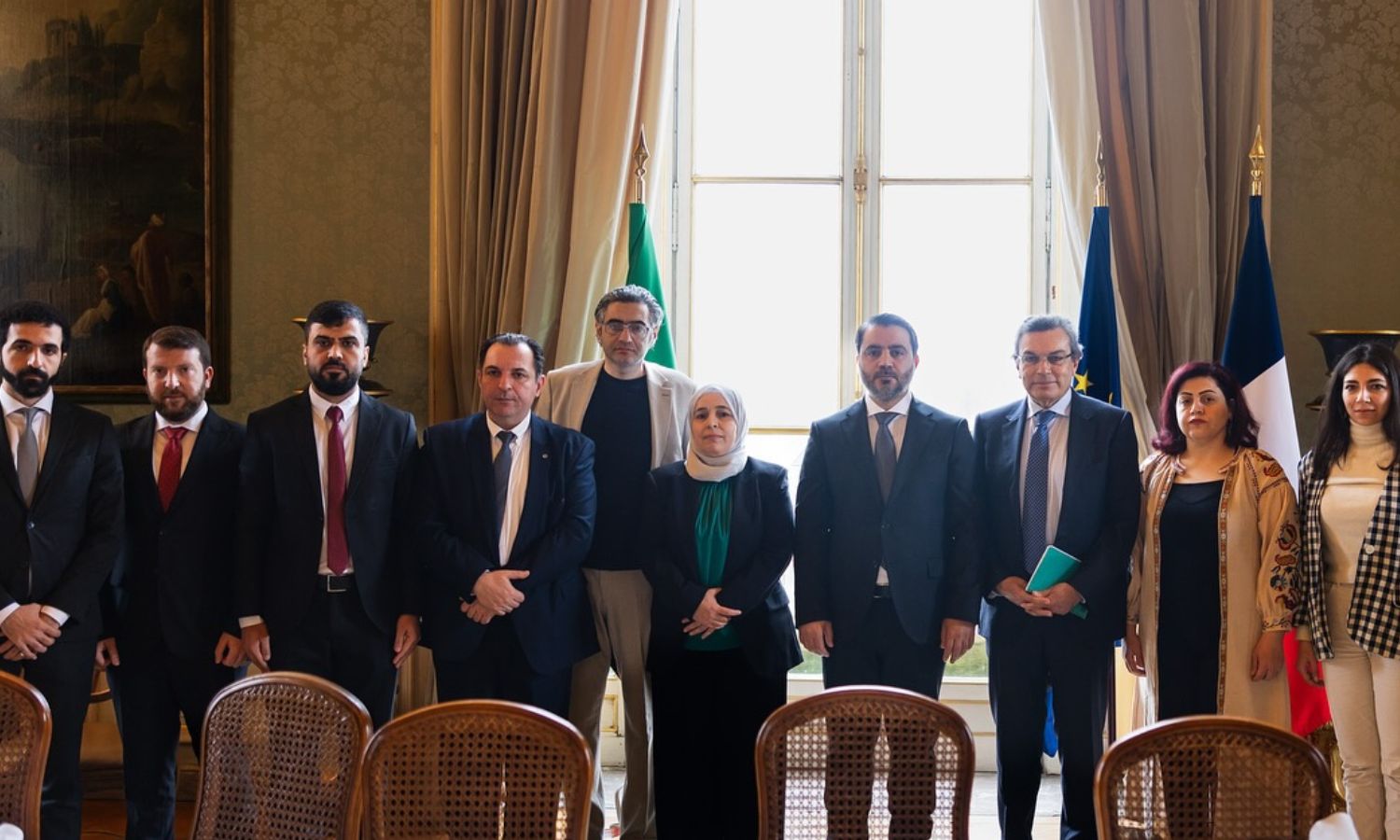
The meeting of the Syrian Foreign Minister, Asaad al-Shibani, with a delegation from Syrian civil society organizations and the families and associations of the victims – February 12, 2025 (Ministry of Foreign Affairs)
Delay warns of chaos
The delay in applying transitional justice in Syria raises concerns about its impact on Syrians, especially victims affected by the regime who are seeking justice to alleviate their suffering and restore part of their rights.
The transitional justice process is long and complex, requiring a sustained effort and time to launch successive tracks that come later, as well as time for achievement. Often, there is a gap in achievements, and realized accomplishments are generally relative, featuring distinctive attributes of each experience of justice and qualitative contributions through creative legal, political, and social thinking, according to a report issued by the Syrian Dialogue Center on February 11.
To prevent victims and their families in the Syrian case from experiencing significant disappointments that undermine their determination for justice, it is crucial to understand the relativity of available achievements and encourage them to propose creative initiatives and ideas to deal with the legacy of the past, according to the report.
According to the report, which reviewed transitional justice experiences in various countries, comparative experiences suggest that proponents of tyranny within society (often a majority, particularly in certain regions and certain sects) strongly attack transitional justice measures, even if they are minimal, such as calling for apologies or issuing short prison sentences, accusing them of being exclusionary, retaliatory, and selective, causing societal division.
On the other hand, supporters of change and victims believe that these measures do not meet aspirations, pardon killers and criminals, and allow for future violations to be repeated, and this debate will continue throughout the period of change and for a long time until the mentality of generations shifts.
In the Syrian case, it is better to encourage Syrians to understand the balance between both sides and that there is no ideal solution that all Syrians agree upon. Rather, the goal is to reach a transitional justice approach that enjoys as much consensus as possible, regardless of the content of this approach, as recommended by the report.
Victims and democracy are affected
The delay in initiating the transitional justice track has several implications for the Syrian case, according to Syrian judge Anwar Majni, primarily diminishing trust within the community, especially among victims, regarding the authority’s ability and willingness to launch this track.
Judge Majni stated in an interview with Enab Baladi that achieving democratic transition requires launching a transitional justice program, and any delay necessarily means a delay in the democratic transition process, enhancing fears regarding the authority’s seriousness in achieving this transition.
The delay in launching the transitional justice track may lead to ongoing societal division and could result in individual retaliatory actions due to a perception of the authority’s unwillingness to hold accountability. It may also mean postponing many issues related to transitional justice, especially regarding reparations, property restitution, and institutional reform, thus weakening the willingness of the displaced to return.
Anwar Majni, Syrian judge
Meanwhile, lawyer Aref al-Shaal considered that speeding up the launch of the transitional justice process would ease the hearts of victims and their families, leading to community stability. However, this is a difficult goal to achieve, as the justice process, regardless of its type, is slow and requires time to ensure fair trials.
Legal environment
Regarding the possibility of Syrian laws accommodating the application of transitional justice or involving international parties in that process, Judge Anwar Majni believes that the fundamental Syrian laws provide an important foundation. However, the local legal system contains several exceptional laws that do not align with the upcoming phase, necessitating today a legislative body to repeal the exceptional laws, especially those related to rights and freedoms. Additionally, there is a need to issue complementary laws that would aid in enhancing the transitional justice process.
As for incorporating international entities, Anwar Majni sees this involvement as significant—not in the process of drafting laws, but in activating the pathways of transitional justice, ensuring that this role remains advisory to provide expertise without being part of the national transitional justice process.
Lawyer Aref al-Shaal mentioned during his talk with Enab Baladi that Syrian laws are suitable for implementing justice, noting that Syria has a good judicial system through which special courts can be established, composed of natural judges, to ensure fair trials, the rights of defense, public hearings, and the ability to challenge any judgments issued.
Al-Shaal believes that what Syria needs from international law is to join the Rome Statute or request the inclusion of war crimes and crimes against humanity committed in Syria since March 2011, as this is needed for technical reasons, allowing those who gave the orders and the leaders to be included, not just the perpetrators of the crime.
Syria also needs technical and material assistance from the international community regarding uncovering the fate of the missing and completing investigations into mass graves, which require substantial personnel and technical devices that are mostly unavailable in Syria.
For his part, the director of the Syrian Network for Human Rights, Fadel Abdul Ghani, stated that it is essential to bring international criminal courts into Syria to operate within their jurisdiction and to prosecute a few individuals (five or six people). He considers this pathway crucial and that the new Syrian government should allow international courts to enter Syria to benefit from the expertise they provide and to reform the judicial structure in Syria.
He also pointed out the need for extensive training for lawyers and judges on handling these crimes and building cases, emphasizing that there is no alternative to national courts that will hold larger numbers accountable. Therefore, we need a significant number of judges and lawyers and their training, which necessitates reforming the judicial institution.
Avoiding vacuum and chaos
Transitional justice embodies a dynamic and non-static concept, meaning it is not a ready-made recipe for application everywhere and at all times in the same manner and measures. Thus, replicating experiences from here or there to apply them in other countries emerging from conflicts with authoritarian regimes is not feasible, according to a report by the Syrian Dialogue Center titled “Transitional Justice and the Importance of Developing the Syrian Approach.”
The report summarizes several reasons driving Syrians to develop their own approach to transitional justice as quickly as possible:
- Despite the wealth of theoretical and knowledge-based resources and the broad spectrum of experiences, it is necessary for Syrians to establish fundamental governing principles for the transitional justice system as soon as possible, as this previous wealth leads to significant diversity in opinions.
- Delayed resolution of core questions leads to scattered paths that result in numerous contradictions to the overall logic of justice, such as some individuals facing judicial accountability in the immediate term and others evading it based on subsequent laws. On the other hand, delays in establishing foundational rules for the process lead to a loss of trust among many victims of the Assad regime’s violations regarding the occurring transformation, fostering individual retribution and resulting in a cycle of violence.
- There is a need to prevent the re-emergence of the fallen regime’s supporters within society, as they might quickly attempt to recreate its ideas in various ways, united by their profound disdain for the revolution and their efforts to thwart it through repositioning in the new structures.
- The Syrian situation has witnessed severe divisions on various levels; thus, the rapid establishment of the fundamental rules of transitional justice will help stabilize society relatively, clarifying the issues of the perpetrator and the victim, the parameters of amnesty, and the characteristics of the former regime’s elements that should not infiltrate the new system.
if you think the article contain wrong information or you have additional details Send Correction
النسخة العربية من المقال
-
Follow us :












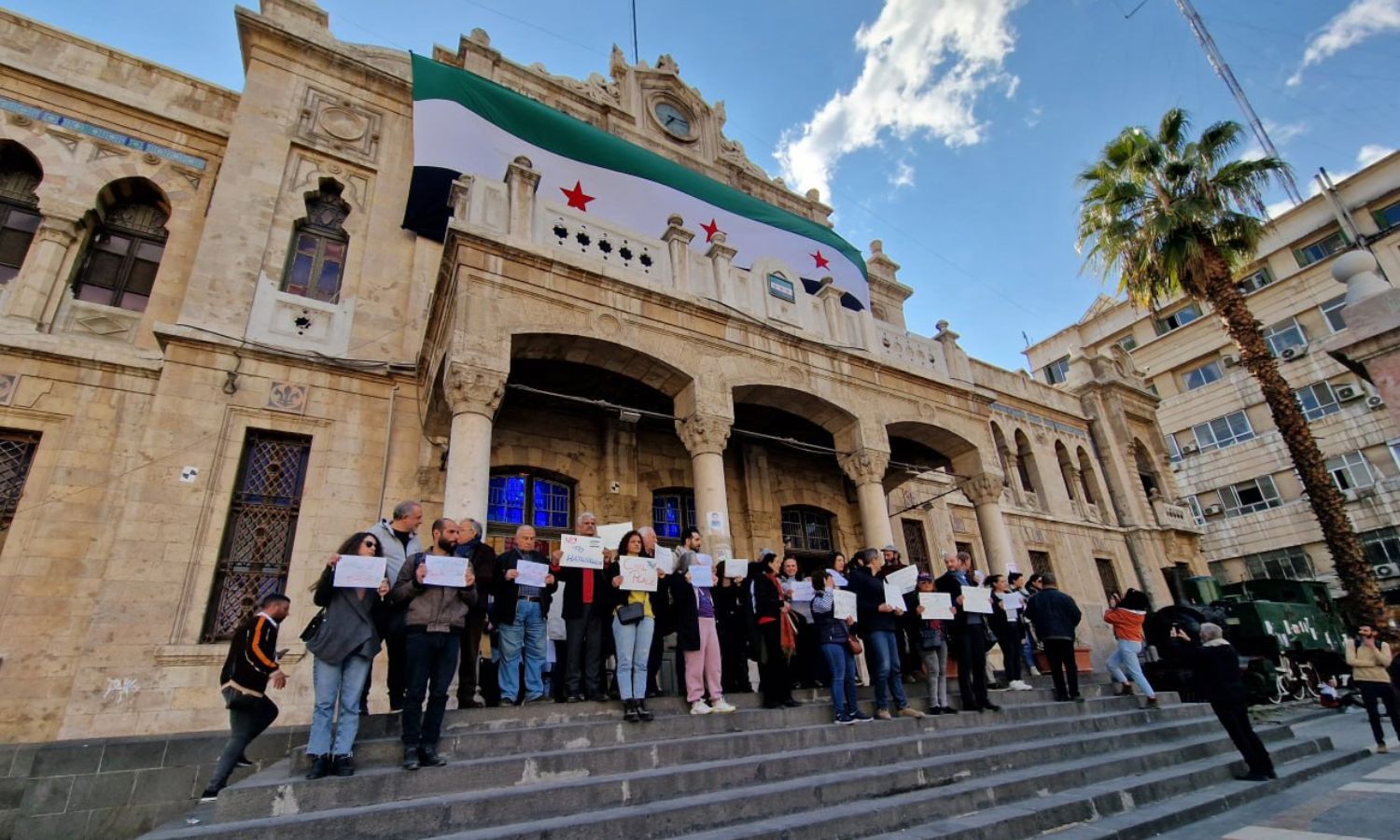
 A gathering demanding the preservation of civil peace in front of the Hijaz railway station in Damascus - January 31, 2025 (Enab Baladi)
A gathering demanding the preservation of civil peace in front of the Hijaz railway station in Damascus - January 31, 2025 (Enab Baladi)





 A
A
A
A
A
A

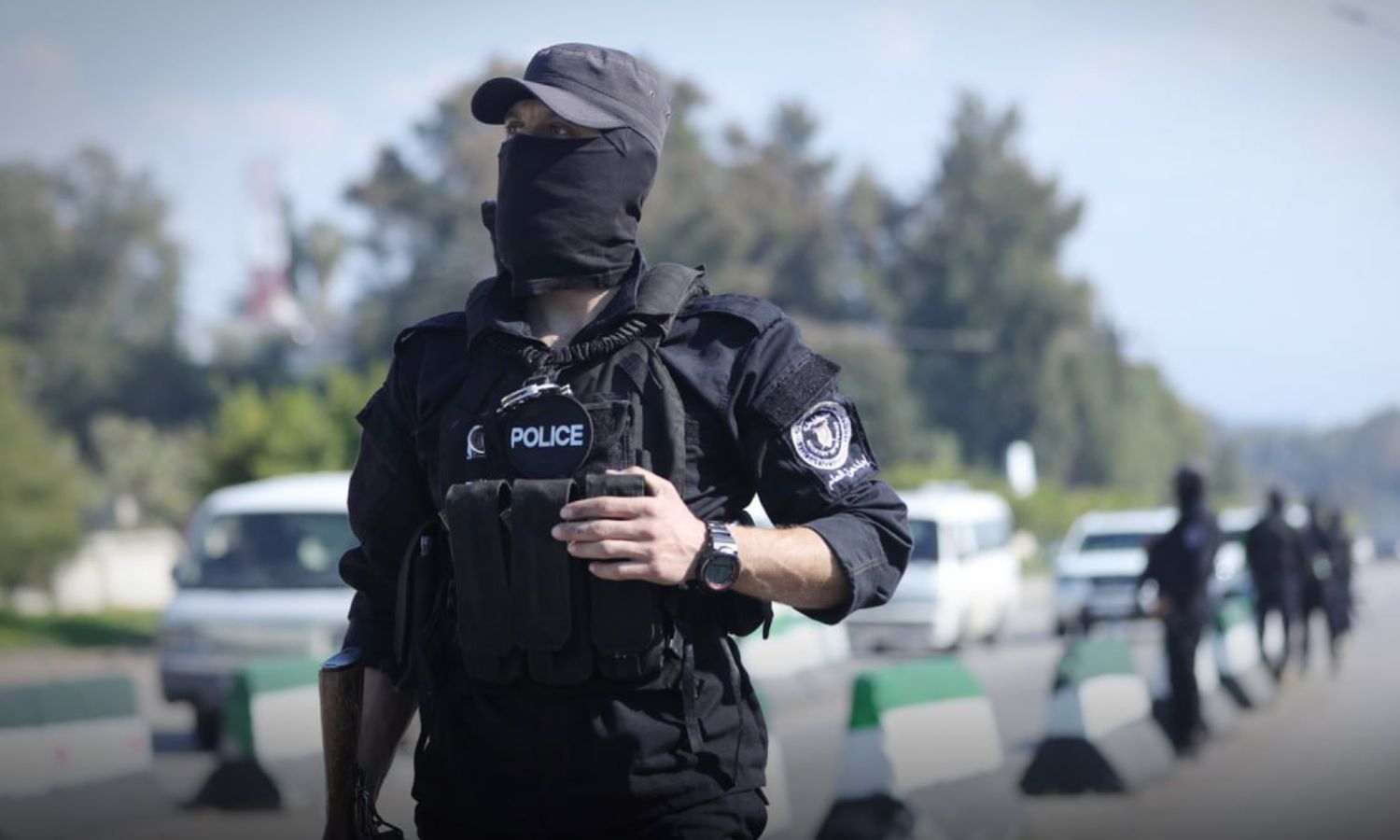
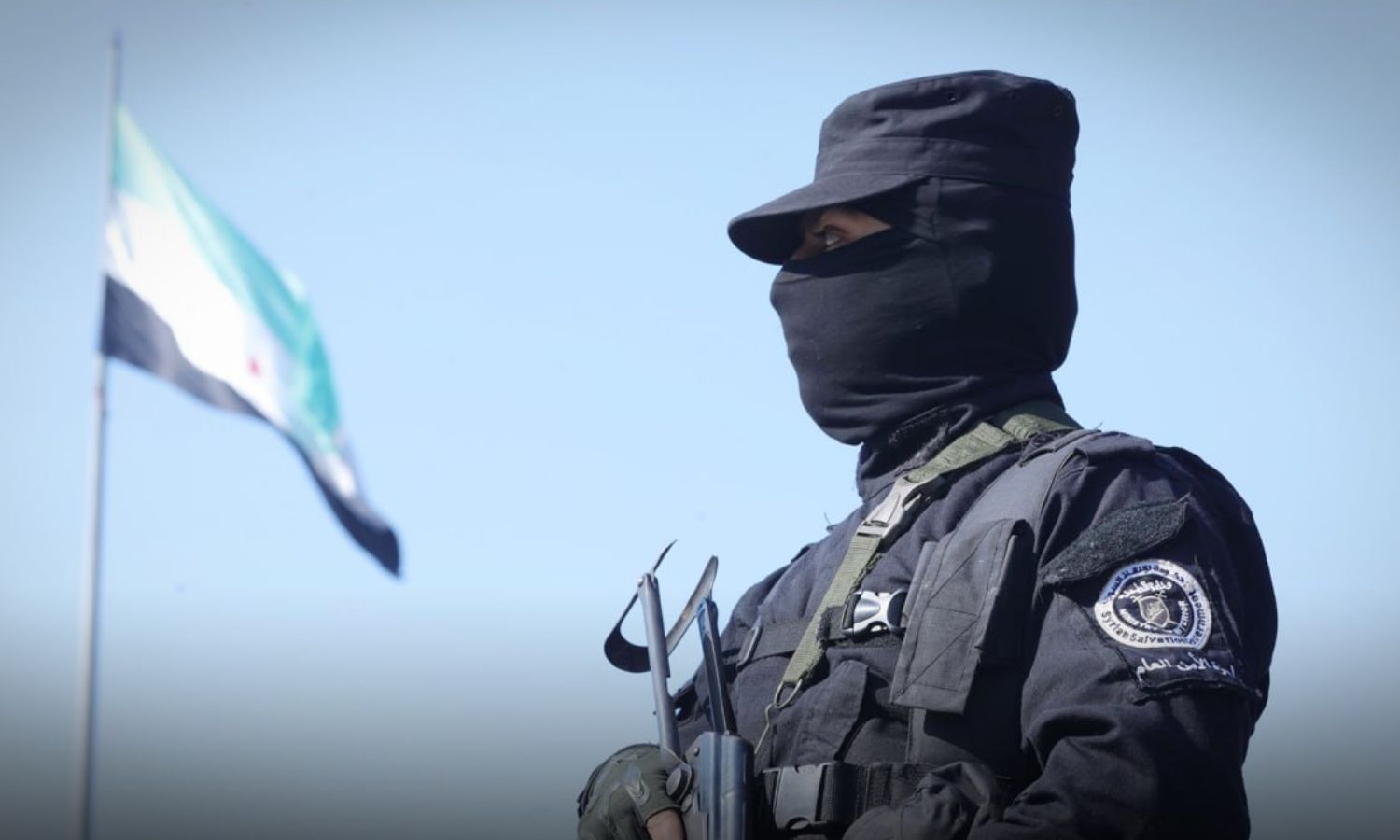


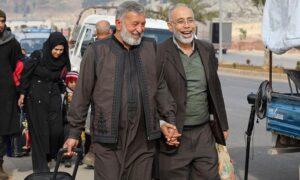

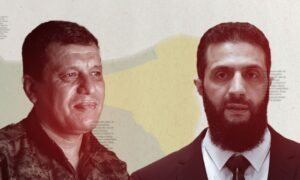

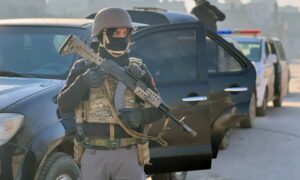
 More In-Depth
More In-Depth